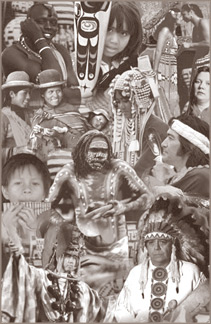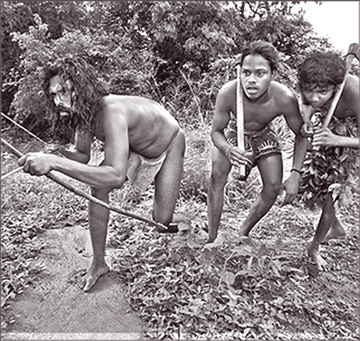|
International Day of the World's Indigenous Peoples
tomorrow:
'Indigenous Media, Empowering Indigenous Voices'
|

World’s Indigenous Peoples
|
The International community observes the International Day of the
World's Indigenous Peoples on August 9 every year. The day provides an
opportunity to raise awareness of indigenous peoples' cultures and great
diversity that they represent. It is also an occasion to redouble
efforts to address issues of exclusion, discrimination and poverty that
are still the daily reality for many of these peoples.
The Day was designated by the United Nations General Assembly in
December 1994.
It commemorates the first meeting of the UN Commission on Human
Rights Working Group on Indigenous Populations held in 1982.
The term 'Indigenous Peoples' generally means native or original
inhabitants of a particular region or country often sharing a collective
identity. The indigenous peoples number around 370 million in 70
countries and represent nearly 4 percent of the world population. United
by many common experiences, including histories of marginalization and
struggles for cultural survivals, they are nonetheless unique and
distinct.
Different languages
Indigenous peoples live in every region in the world. They live in
climates ranging from Arctic cold to Amazon heat, and often claim a deep
connection to their lands and natural environments. For many indigenous
peoples, the natural world is a valued source of food, health,
spirituality and identity. Land is both a critical resource that
sustains life and a major cause of struggle and even death. They live in
more than 70 countries scattered in all regions of the world and speak
over 4,000 different languages.
Among many indigenous peoples are the Indians of the Americas, the
Inuit and Aleutians of the circumpolar region, the Saami of Northern
Europe, the Aborigines, and Torres Strait Islanders of Australia, the
Maori of New Zealand and Veddahs of Sri Lanka. These and most other
indigenous peoples have retained social, cultural, economic and
political characteristics which are clearly distinct from those of the
other segments of the national populations.
Throughout human history, whenever dominant neighbouring peoples have
expanded their territories or settlers from far away have acquired new
lands by force, the cultures and livelihoods - even the existence - of
indigenous peoples have been endangered.
The threats to indigenous peoples' cultures and lands, to their
status and other legal rights as distinct groups and as citizens, do not
always take the same forms as in previous times. Although some groups
have been relatively successful, in most part of the world indigenous
peoples are actively seeking recognition of their identities and ways of
life.
Priorities and aspirations
|

Veddah community |
This year's Day is devoted to 'Indigenous Media, Empowering
Indigenous Voices', highlighting the importance of indigenous media in
challenging stereotypes, forging indigenous peoples' identities, and
influencing the social and political agenda. Ban Ki-Moon , Secretary
General of the United Nations in his message to mark the International
Days of the World's Indigenous Peoples 2012 says "indigenous voices are
recounting compelling stories of how they are combating centuries of
injustice and discrimination, and advocating for the resources and
rights that will preserve their cultures, languages, spirituality and
traditions. They offer an alternative perspective on development models
that exclude the indigenous experience. They promote the mutual respect
and intercultural understanding that is a precondition for a society
without poverty and prejudice."
The Secretary General pledges the full support of the UN system to
cooperate with indigenous peoples, including their media, to promote the
full implementation of the Declaration and calls on Member States and
the mainstream media to create and maintain opportunities for indigenous
peoples to articulate their perspectives, priorities and aspirations.
Indigenous peoples have been working with the United Nations to name and
assert their collective rights for decades.
The General Assembly declared its first International Decade of the
World's Indigenous Peoples in 1994 and the 2nd in 2005. The UN
Declaration on the rights of the Indigenous Peoples was adopted by the
General Assembly on September 13, 2007 following its adoption by the
Human Rights Council in June 2006.
"In the five years since the adoption of the UN Declaration,
communities and individuals have been taking advantage of the reach of
traditional and new media to tell their story and make their voices
heard", says UNSG. |



